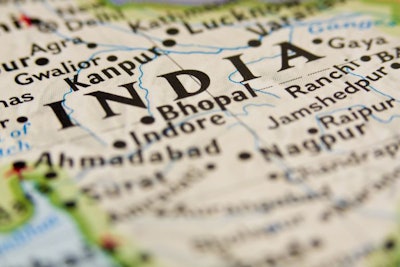
COVID-19 is leading to problems in the supply of livestock feeds in parts of India.
With the Indian population in enforced lockdown, a shortage of labor is beginning to negatively affect livestock and poultry production in the northeastern state of Assam.
Among the restrictions introduced by the government to control the spread of the new coronavirus (COVID-19) pandemic is the compulsory closure of feed mills, reports Telegraph India. In addition, most retail stores are also shuttered, and transportation is only operating for the delivery of “essential items.”
With so many vital business functions impacted by these measures, farmers are finding supplies of feed are running low. Furthermore, the shortages of labor and transport means much-needed feed cannot be loaded, unloaded and delivered to waiting farms.
According to one source, some smaller feed mills are continuing production. Larger operations may reopen if staff can be found for their operation, and the workers can achieve social distancing — at least two meters between people. In some cases, a lack of curfew passes is an additional hurdle to businesses.
Assam is heavily reliant on supplies from other Indian states. In normal times, around half of the state’s livestock feed requirements are brought in from neighboring regions.
One feed company that regularly supplies Assam’s farmers is Maharashtra Feeds Private Ltd. One of the company’s officials said that, although the transportation of feeds is permitted, there are not enough workers to load the vehicles.
In Assam, 16 large feed mills daily manufacture around 150 metric tons (mt) of feed, while up to 30 more facilities have a capacity of about 1 mt. According to Telegraph India, there are up to 50 large government-run livestock farms in the state.
Consequences of feed shortages for farmers
More than 600,000 chickens have been culled on one farm that was unable to secure feed supplies, reported the chairman of the state Livestock and Poultry Corp.
Another challenge for farmers is a sudden drop in the number of outlets for their products. With many meat and poultry shops closed, producers have lost access to their regular markets. While some farmers are culling their animals, others are being forced to accept much lower prices than usual.
‘Swine fever’ reported
As well as disruption in the livestock feed supply chain, the presence of notifiable animal diseases has recently been reported in two of India’s northeastern states.
In recent days, mortality of “thousands of pigs” has occurred in Assam, reports Telegraph India. Occurring in three different districts, cause of death is attributed to “swine fever.”
Almost 90 pigs died suddenly in Bhagalpur during March, according to Times of India. These losses too were attributed to “swine fever.”
Bhagalpur city and district are located in Bihar. Like Assam, Bihar is located in northeastern India. The states do not share a common border.
India’s veterinary authority has not reported any cases of African swine fever to the international animal disease agency. However, classical swine fever was known to be present in some areas of the country as recently as 2018, according to the World Organisation for Animal Health (OIE).
Since the start of the year, the highly pathogenic avian influenza virus has been detected in three Indian states — Karnataka, Kerala and Odisha. So far, the infection appears to be confined to small areas, and few poultry have succumbed to the disease.

















